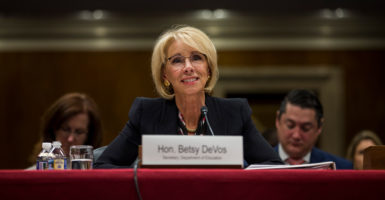A Justice Department summit on fighting anti-Semitism brought together Trump administration leaders such as Attorney General William Barr and Education Secretary Betsy DeVos with prominent figures in the Jewish community.
“I am deeply concerned about the rise in hate crimes and political violence that we have seen over the past decade,” Barr said in his opening remarks Monday. “This trend has included a marked increase in reported instances of anti-Semitic hate crimes.”
The attorney general cited the divisive role “identity politics” is playing.
“My concern today is that under the banner of identity politics, some political factions are seeking to obtain power by dividing Americans, and they undermine the values that draw us together, such as a shared commitment to our country’s success,” Barr said. “This is the breeding ground for hatred and we must reject it.”
The summit included panel discussions with titles such as “Combating Anti-Semitism While Respecting the First Amendment,” “Anti-Semitism on Campus,” and “Prosecuting Hate Crimes.”
DeVos shared her remarks just ahead of the discussion on anti-Semitism on college campuses.
“One of the most pernicious and prevalent examples of anti-Semitism on campus is the campaign known as BDS,” DeVos said. “These campus bullies claim they stand for human rights, but we all know BDS stands for anti-Semitism.”
The BDS movement, for “boycott, divestment, sanctions,” describes itself on its website as a “Palestinian-led movement for freedom, justice and equality.”
“We recently made clear at Williams College that these kinds of efforts are unacceptable,” DeVos said. “Students there tried to register a pro-Israel group, but after much anti-Semitic uproar, the college council denied the group recognition.”
According to the Jewish Telegraphic Agency, the student council voted against the pro-Israel group on “political grounds” because student activists “expressed concerns about its support for Israeli policies regarding Palestinians.”
“We negotiated [an] agreement with the college that affords the pro-Israel group the same rights and privileges as any other student group,” DeVos said.
In a separate matter, DeVos called for an investigation of a conference held by the Duke-University of North Carolina Consortium for Middle East Studies, after accusations that part of the conference was anti-Semitic.
According to The Chronicle, Duke’s news organization, “the conference drew a firestorm of controversy after a video was posted online, showing rapper Tamer Nafar of the music group DAM, a guest performer at this year’s conference, talking about singing his ‘anti-Semitic’ song, as he called it.”
“These are just two examples of what the Department of Education is doing to protect students from discrimination, and we are intent on ensuring protection for students across the country,” DeVos said. “This administration is and always will be committed to ensuring all believers can live and practice their faith without fear.”
During the panel on Trump administration leadership’s efforts to oppose anti-Semitism, Treasury Secretary Steve Mnuchin noted the importance of education about the Holocaust.
“I am proud that we use our economic authorities, including sanctions, to disrupt funding and isolate human rights abusers,” Mnuchin said.
FBI Director Christopher Wray laid out three ways the FBI is combating anti-Semitic threats:
First, we’re coordinating with our state and local law enforcement partners even when we’re not pursuing federal charges, because we learn more when we work these cases together. Second, we’re working with civil rights and minority groups and with faith communities to build trusted relationships as they say, ‘The best time to patch the roof is when the sun is shining, not when the bad weather comes,’ and we shouldn’t be meeting for the first time in the wake of a crisis. Third, we’re training our partners, both in law enforcement and the communities we serve, so that everyone’s got a better understanding of what hate crime is and how we can help them.
Wray noted that through joint terrorism task forces, the FBI gains a local perspective of what is happening on the local level.
“We have community outreach specialists who work with members of the Jewish community to talk about what we’re seeing and to explore how we can help even better,” Wray said.
“Just last month, we hosted a faith-based summit at FBI headquarters for representatives of Jewish, Christian, Muslim, and other religious groups,” Wray added. “That kind of communication, those kinds of relationships, are so important to the work we do.”
He also mentioned that some FBI field offices have held “active shooter exercises” and presentations on “protecting houses of worship” with local synagogues to raise awareness.
“When we can’t prevent a hate crime, our agents and analysts will move heaven and earth to find those responsible. We’re going to keep doing everything we can to help, for the people who need it the most,” Wray said.
“Because the way we look at it, we’re not just law enforcement, we’re part of the community and we’re in this together.”































